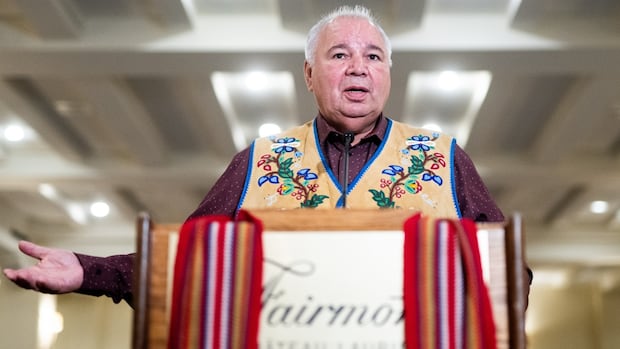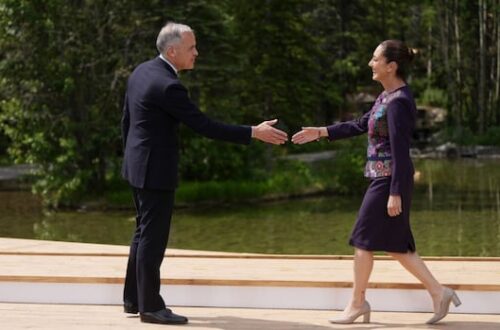Manitoba Métis leaders announced Wednesday they intend to boycott this week’s summit with Prime Minister Mark Carney because the Liberal government is including the Métis Nation of Ontario (MNO).
Other Métis groups are also expressing concerns about the process after confirming they weren’t invited to Thursday’s meeting in Ottawa to discuss the federal government’s recently passed law to fast-track major projects.
It’s the last of three summits called this summer to ease Indigenous Peoples’ concerns about the law, known as bill C-5, yet it’s unclear how many people will even be there.
“We will not be attending that summit,” Manitoba Métis Federation President David Chartrand said at a news conference inside the Chateau Laurier hotel in Ottawa on Wednesday morning.
Flanked by his cabinet, Chartrand told reporters he considers MNO a “fraudulent” organization with which Manitoba leaders can’t share a table.
“To the prime minister, the door is open. If you want to come and sit down with my cabinet in a government-to-government relationship, we will meet,” he said.
“But if you want to insult us, then we’ll see each other in a different political realm in the future. So unfortunately, it’s a sad day for us. Truly.”
In an interview earlier Wednesday, an MNO spokesperson pointed to the group’s signed self-government agreement with Canada, brushing off any concerns from Manitoba.
“We’re here to talk about our serious concerns about C-5 and our serious concerns about Canada’s position globally,” said Mitch Case, MNO provincial secretary for Métis rights, intergovernmental relations and communications.
In 2003, the Supreme Court of Canada recognized the existence of a rights-bearing Métis community in and around Sault Ste. Marie, Ont. At issue, however, are six “new historic” Métis communities MNO and the Ontario government jointly recognized in 2017.
First Nations in Ontario contest the communities’ legitimacy and MMF, the federally recognized government for the Red River Métis, withdrew from the Métis National Council in 2021 over the dispute.

Case said it would be indefensible for Canada to exclude the Ontario Métis, adding that the goal should be finding a collaborative way to address the United States’ economic threats while protecting the environment and respecting Indigenous rights.
“That’s the conversation we’re here to have. If people want to try to distract from that conversation with their own political goals, well, that’s up to them. But we’re here to do important work,” he said.
Not all Métis invited
Chartrand indicated Canada invited the four Métis groups that have signed self-government agreements: Otipemisiwak Métis Government (OMG) in Alberta, Métis Nation-Saskatchewan, MMF and MNO.
But there are some communities, like Fort Chipewyan Métis Nation in northern Alberta, that don’t belong to any provincial body. An official with that community said this process is “not proper consultation,” as the Fort Chipewyan Métis aren’t represented by OMG.
“It goes against reconciliation, and the process appears to be flawed right out of the gate,” said Carmen Wells, lands and regulatory director for the Fort Chipewyan Métis Nation.
Wells said the community chooses to have its own voice because it’s situated at “ground zero,”
in a region most impacted by industrial development in Canada — the oilsands.
“We also expect not to be left out of those conversations, as we are our own sovereign nation with constitutionally protected rights,” said Fort Chipewyan Metis Nation President Kendrick Cardinal in a statement.
Up until recently the Métis National Council had five members, but the MMF’s exit was followed by the Métis Nation-Saskatchewan and the Métis Nation British Columbia (MNBC) in 2024. Chartrand said the national council shouldn’t be included at the summit, even as an observer.
The B.C. group wasn’t invited to participate in Carney’s summit except as an observer, MNBC President Walter Mineault told CBC Indigenous. He said MNBC is still an important stakeholder that deserves to be at the table even if it lacks a formal self-government agreement.
“It’s very disrespectful to our nation here in B.C. and our government, and it should not happen,” he said.
“We are very concerned about these issues as well going forward.”
Back in Ottawa, Otipemisiwak Métis Government President Andrea Sandmaier focused on the meeting itself, calling it as a chance to ensure Métis voices are heard.
“I believe that it’s possible for the Crown and our nation to prosper together. We’re not here to hold up or block progress,” she said.
“We’re here to help shape a future where economic growth, environmental protection and Indigenous rights advance together, and I think that we have a really good opportunity to make that happen.”
Chartrand said he would not consider withdrawing the MMF’s support for C-5, but he did offer Carney a heated warning against “back stabbing” the Red River Métis and ignoring their rights.
CBC Indigenous has reached out to the Office of the Prime Minister for comment but did not receive a response by time of publishing.





